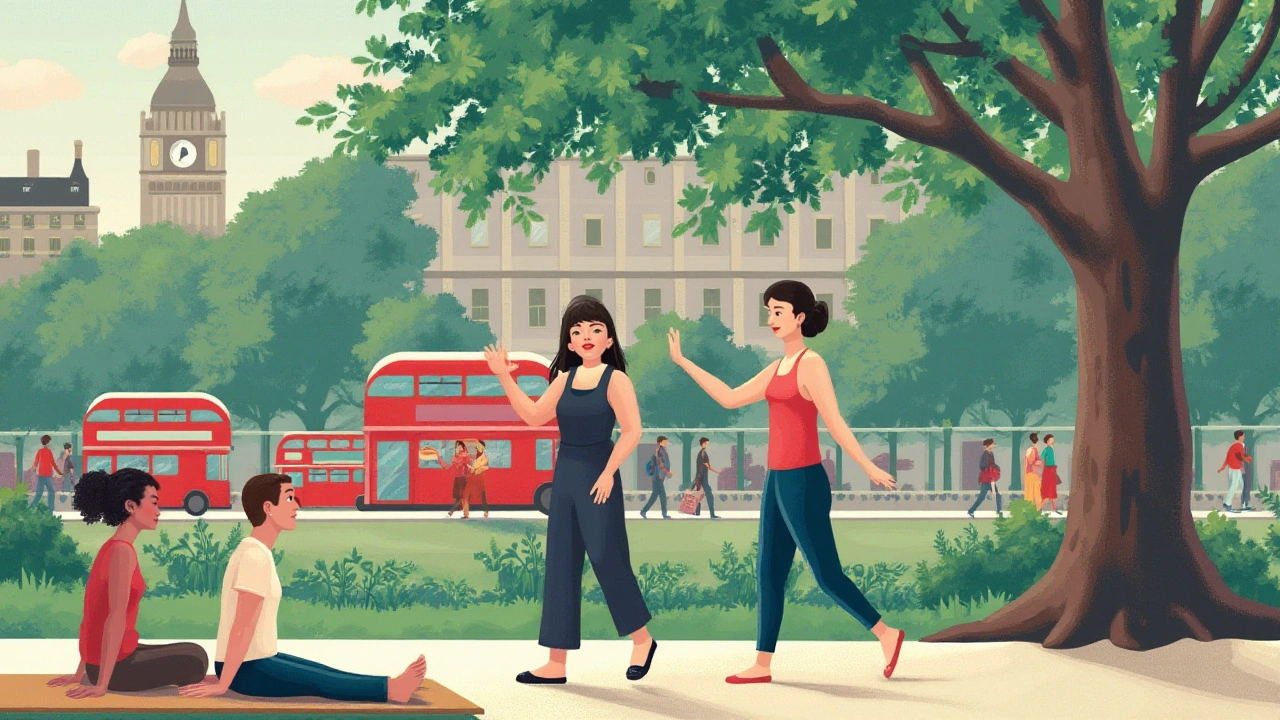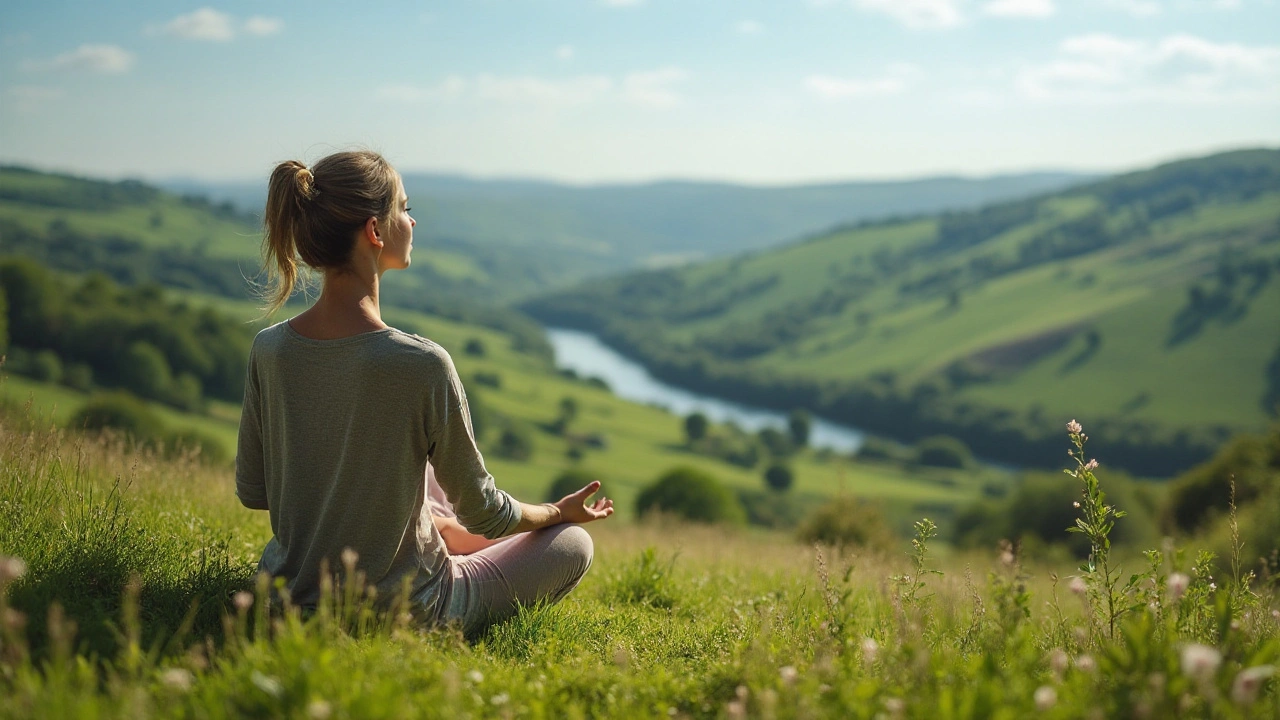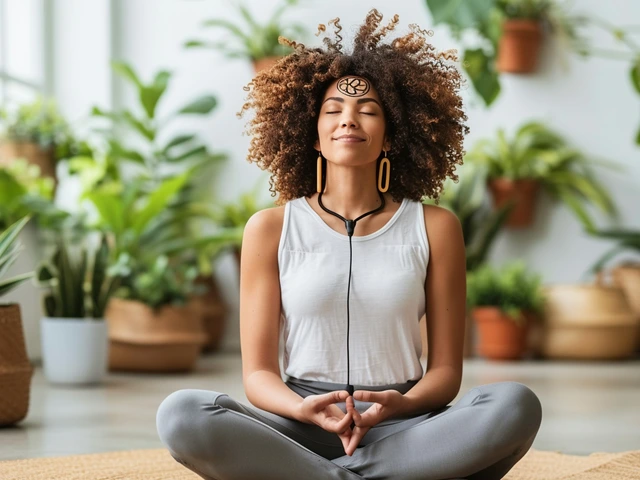In a fast-paced world, finding ways to relax is crucial for maintaining mental health. Relaxation techniques not only soothe the mind but also help improve overall wellbeing. Let's dive into simple yet powerful methods that can make a big difference in your day-to-day life.
From deep breathing exercises to engaging your muscles in progressive relaxation, these techniques can be easily practiced anywhere. Incorporating mindfulness into everyday activities and setting aside a few minutes for meditation can provide significant relief from stress.
Whether you're at home, at work, or on the go, there's always a way to find calm. Let's explore some of these effective techniques and see how they can help you create a more peaceful state of mind.
- The Importance of Relaxation
- Deep Breathing Exercises
- Progressive Muscle Relaxation
- Meditation for Mental Clarity
- Mindfulness in Daily Activities
- Quick Tips for Instant Calm
The Importance of Relaxation
Relaxation is not just a luxury; it's a necessity for maintaining balanced mental health and overall well-being. When we relax, we give our bodies and minds a much-needed break from the constant demands of daily life. Chronic stress has been linked to various health problems including heart disease, high blood pressure, diabetes, and mental health disorders like anxiety and depression. According to the American Institute of Stress, reducing stress through relaxation can alleviate numerous health risks.
One of the most compelling reasons to practice relaxation techniques is their impact on our mental health. Engaging in regular stress relief activities helps to lower the levels of cortisol, the stress hormone, in our bodies. High levels of cortisol can interfere with learning and memory, lower immune function, and increase weight gain, blood pressure, cholesterol, and heart disease.
Simple yet effective relaxation practices can transform your daily routine and overall outlook on life. For instance, deep breathing exercises not only calm the mind but also oxygenate your brain, making you feel more alert and refreshed. Recent studies show that people who engage in daily mindfulness activities experience lower stress levels and improved focus.
"The greatest weapon against stress is our ability to choose one thought over another." — William James
Another benefit of relaxation is the improvement of sleep quality. Our minds are often racing with thoughts of unfinished tasks and worries, making it difficult to fall asleep. Techniques like progressive muscle relaxation can help ease this mental clutter, allowing for a more restful night's sleep. Better sleep, in turn, enhances our mood and overall functionality throughout the day.
Relaxation also plays a crucial role in emotional regulation. It's easier to manage emotions and react calmly to difficult situations when you're relaxed. For example, mindfulness practices encourage you to live in the moment, reduce your anxiety about the future, and stop ruminating over the past. These techniques help create a mental buffer that separates you from stress, allowing you to approach situations more rationally.
Incorporating relaxation techniques into your daily routine doesn't have to be time-consuming. Even spending a few minutes a day on activities like deep breathing, progressive muscle relaxation, or mindfulness can produce significant benefits. Over time, these small changes can lead to a more resilient and stress-free life.
Progressive Muscle Relaxation
Progressive Muscle Relaxation (PMR) is an effective and simple technique to manage stress and increase relaxation. This method involves tensing and then slowly relaxing different muscle groups in your body, one at a time. It was developed by Dr. Edmund Jacobson in the 1920s, who believed that physical relaxation could bring about mental calm. This technique is widely recommended by health professionals due to its benefits for anxiety and stress relief.
To start, find a quiet place where you can sit or lie down comfortably without disturbances. Begin by taking slow, deep breaths to calm your mind. Start with your feet, curling your toes tightly for about five seconds, and then slowly release the tension, feeling the relaxation spread through your foot. Move up your body, focusing next on your calves, then thighs, and so forth, until you reach your face. By systematically tensing and relaxing each muscle group, you can help mitigate the physical symptoms of stress.
Researchers from Harvard Medical School have noted, “Progressive muscle relaxation can reduce heart rate, lower blood pressure, and decrease muscle tension.” Stress relief practiced regularly can also improve your sleep and overall well-being. With each practice, you'll likely become more aware of where you hold your tension, making it easier to manage stress in daily life. Take your time with each muscle group, ensuring that you truly feel the difference between tension and relaxation.
As you become more familiar with PMR, you can streamline the process by grouping muscle areas together. For example, instead of working on each part of your arm separately, you can tense your entire arm at once. This flexibility allows you to practice even when you have less time. Many people incorporate these exercises into their daily routines, either in the morning to start the day relaxed or in the evening to unwind.
For an enhanced experience, you can play soft, soothing music in the background or use guided audio recordings. Numerous free resources are available online to guide you through PMR sessions. Some people find it helpful to visualize the stress leaving their body with each release of tension, which can make the experience more effective and engaging.
If you're new to this technique, patience is key. Like any skill, it becomes easier and more effective with practice. Initially, it might seem counterintuitive to tense your muscles to achieve relaxation, but soon you'll notice how your body feels lighter and calmer afterwards. Over time, you will be able to execute these relaxation techniques swiftly and subtly, even in situations where complete relaxation isn't feasible, such as at your desk or during a quick break at work.
A clinical trial published in the Journal of Clinical Psychology found that participants who practiced PMR experienced a significant reduction in anxiety and stress levels in just four weeks. This shows that even a short commitment to this technique can yield noticeable benefits. Whether you're dealing with chronic stress or just an occasional bout of nerves, progressive muscle relaxation is a powerful tool to have in your relaxation toolkit.

Meditation for Mental Clarity
Meditation has been practiced for thousands of years and is well-known for its ability to improve mental clarity and reduce stress. Studies show that just a few minutes of meditation each day can significantly impact your mental health. By focusing your mind and eliminating distractions, you can foster a peaceful and clear state that lasts throughout your day.
One popular form of meditation is mindfulness meditation, where you focus on your breath and gently bring your mind back whenever it starts to wander. This technique helps in reducing anxiety and promoting a sense of calm. Another method is transcendental meditation, which involves silently repeating a mantra. This practice can help alleviate stress and lead to better mental health.
Dr. Sara Lazar of Harvard Medical School conducted a study that showed how meditation can increase grey matter in the brain, particularly in areas related to memory, sense of self, empathy, and stress management. This means regular meditation can make your brain more efficient at handling everyday challenges.
"Meditation is a way for nourishing and blossoming the divinity within you." - Amit Ray
Meditation doesn't require any special equipment or a specific location. You can practice it anywhere, from the comfort of your home to a quiet corner of your office or even a park bench. All you need is a few minutes of quiet time and a willingness to devote attention to your inner self.
The Anatomy of a Simple Meditation Session
To start a basic meditation session, follow these easy steps:
- Find a quiet spot: Choose a place where you are unlikely to be disturbed.
- Get comfortable: Sit or lie down in a position that feels natural. Keep your back straight to allow for easy breathing.
- Close your eyes: This helps in minimizing distractions and allows you to focus inward.
- Focus on your breath: Pay attention to the natural rhythm of your breathing. Feel the air entering and leaving your body.
- Gently redirect your mind: If your thoughts wander, gently bring your focus back to your breath without judgment.
- Start small: Begin with just 5 minutes a day and gradually increase the duration as you become more comfortable with the practice.
Several apps and online resources offer guided meditation sessions, which can be especially helpful for beginners. These can provide structure and guidance as you start your meditation journey.
Mindfulness in Daily Activities
Incorporating mindfulness into daily activities is an excellent way to find moments of peace in the chaos of everyday life. The key to mindfulness is to immerse yourself fully in whatever you are doing, paying attention to your senses, movements, and thoughts without judgment. Mindfulness isn't confined to meditation or quiet spaces; it can be woven into virtually any task you perform.
Consider starting with morning routines. Instead of rushing through breakfast or a shower, take the time to notice the details. Savor the taste of your food, the warmth of your coffee, or the sensation of water on your skin. This attentive awareness can set a peaceful tone for the rest of your day.
When you are at work, practice mindfulness while performing tasks. Focus on the task at hand and avoid multitasking. Whether you're typing an email or attending a meeting, give your full attention to it. This approach not only helps reduce stress but can also increase productivity and job satisfaction. John Kabat-Zinn, the founder of the Mindfulness-Based Stress Reduction (MBSR) program, says, "The best way to capture moments is to pay attention. This is how we cultivate mindfulness."
Mindful walking is another effective technique. Instead of walking on autopilot, notice the feeling of the ground under your feet, the rhythm of your breath, the sounds around you. This method can be particularly grounding if you are feeling anxious or stressed.
Even household chores offer opportunities for mindfulness. Washing dishes, for example, can be transformed into a meditative experience. Feel the temperature of the water, the texture of the soap, and the movements of your hands. This simple shift in perception can make mundane tasks more enjoyable and relaxing.
Mindful Communication
Practice mindfulness during conversations. Listen intently to the person speaking without preparing your response while they are talking. This kind of active listening can improve relationships and reduce misunderstandings. Pay attention to their words, tone, and body language. It's a simple change that can foster deeper connections with others.
Lastly, bring mindfulness into your self-care routines. When you exercise, be present in your body. Notice your muscles working, your breath moving in and out, and your heart rate increasing. This focus transforms regular exercise into a more fulfilling and thoughtful activity.
Stress relief through mindfulness isn't about changing what you do but changing how you do it. Gradually integrating these practices into your daily life can build a foundation of calm and clarity, making it easier to handle life's ups and downs.

Quick Tips for Instant Calm
Finding immediate relief from stress can make a significant impact on your daily routine. Sometimes, you don't have the luxury of time or the right setting to do a full meditation session or an extensive relaxation exercise. For those moments, consider these quick tips to soothe your mind and find some peace right away. A well-known fact is that short, mindful practices can effectively reduce stress levels and improve mental well-being.
A simple yet powerful method is deep breathing. When you feel stressed, take a moment to focus on your breath. Inhale deeply through your nose, hold for a few seconds, then exhale slowly through your mouth. This action sends a signal to your brain to calm down and relax. According to Dr. Andrew Weil, a Harvard-trained doctor, deep breathing can be an excellent way to quell stress in seconds.
Another useful tip is to practice mindfulness in everyday activities. Whether you're eating, walking, or even washing dishes, fully immerse yourself in the activity. By paying close attention to the sights, sounds, and sensations around you, you can distract your mind from stressors and bring yourself into the present moment. This practice not only calms your mind but also enhances your overall *mental health*.
Listening to music is another quick way to unwind. Studies reveal that music with a slow tempo can lower heart rate and blood pressure, which in turn helps to reduce stress. Create a playlist of your favorite calming tracks and have it ready for those moments when you need an instant sense of calm. Keep a pair of headphones handy, so you're always prepared for a quick musical escape.
Consider engaging your sense of smell for quick relaxation. Essential oils like lavender, chamomile, and sandalwood are known for their calming effects. Keep a small bottle of your favorite scent in your bag or desk drawer for easy access. A quick sniff can transport you to a more peaceful state of mind almost instantly. You can also use a diffuser at home to create a calming atmosphere.
Physical exercise, even in short bursts, can help to reduce stress. Whether it's a brisk walk around the block or a quick set of jumping jacks, physical activity releases endorphins that elevate your mood. Don't underestimate the power of a five-minute workout to help you regain a sense of calm and control.
If you have just a few moments to spare, try the '5-4-3-2-1' grounding technique, a simple way to get out of your head and connect with your surroundings. Look around and find:
- 5 things you can see
- 4 things you can touch
- 3 things you can hear
- 2 things you can smell
- 1 thing you can taste
This exercise brings you back to the present and helps you focus on physical sensations rather than the racing thoughts in your mind.
“In today's rush, we all think too much - seek too much - want too much - and forget about the joy of just being.” — Eckhart Tolle
Finally, never underestimate the power of a good laugh. Laughter has been proven to relieve stress by inducing physical changes in the body. Watch a funny video, read jokes, or chat with a friend who always makes you laugh. The immediate burst of joy can do wonders for your mental state.
Implementing these quick tips can create immediate pockets of peace in your busy day. Remember, even the smallest steps can lead to significant improvements in your mental wellbeing.






